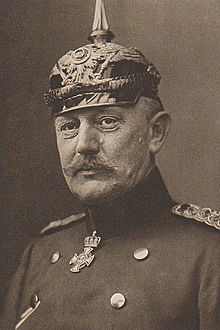Helmuth von Moltke the Younger
| Helmuth Johann Ludwig von Moltke | |
|---|---|
 |
|
| Nickname(s) | Moltke the Younger (Moltke der Jüngere) |
| Born |
25 May 1848 Biendorf, Grand Duchy of Mecklenburg-Schwerin, German Confederation |
| Died | 18 June 1916 (aged 68) Berlin, Kingdom of Prussia, German Empire |
| Buried at | Invalids' Cemetery |
| Allegiance |
|
| Service/branch |
Prussian Army Imperial German Army |
| Years of service | 1868–1916 |
| Rank | Generaloberst |
| Commands held | 1st Guards Infantry Brigade 1st Guards Infantry Division Chief of the General Staff |
| Battles/wars |
Franco-Prussian War World War I |
| Awards |
Pour le Mérite Order of the Red Eagle House Order of the Wendish Crown Knight Commander of the Royal Victorian Order |
Helmuth Johann Ludwig von Moltke (German pronunciation: [ˈhɛlmuːt fɔn ˈmɔltkə]; 23 May 1848 – 17 June 1916), also known as Moltke the Younger, was a nephew of Generalfeldmarschall (Field Marshal) Helmuth Karl Bernhard von Moltke and served as the Chief of the German General Staff from 1906 to 1914. The two are often differentiated as Moltke the Elder and Moltke the Younger.
Helmuth von Moltke was born in Biendorf, Grand Duchy of Mecklenburg-Schwerin, and was named after his uncle, Helmuth Karl Bernhard von Moltke, future Generalfeldmarschall (Field Marshal) and hero of the Unification of Germany. During the Franco-Prussian War, Moltke served with the 7th Grenadier Regiment and was cited for bravery. He attended the War Academy between 1875 and 1878 and joined the General Staff in 1880. In 1882 he became personal adjutant to his uncle, who was then Chief of the General Staff. In 1891, on the death of his uncle, Moltke became aide-de-camp to Kaiser Wilhem II, thus becoming part of the Emperor's inner circle. In 1898 he became commander of the 1st Guards Infantry Brigade and in 1902, being promoted to Lieutenant General, received command of the 1st Guards Infantry Division.
In 1904 Moltke was made Quartermaster-General; in effect, Deputy Chief of the General Staff. In 1906, he became chief on the retirement of Alfred von Schlieffen. His appointment was controversial then and remains so today. The other likely candidates for the position were Hans Hartwig von Beseler, Karl von Bülow and Colmar Freiherr von der Goltz. Critics charge that Moltke gained the position on the strength of his name and his friendship with the Kaiser. Certainly, Moltke was far closer to the Kaiser than the other candidates. Historians argue that Beseler was too close to Schlieffen to have succeeded him, while Bülow and Goltz were too independent for Wilhelm to have accepted them. Moltke's friendship with the Kaiser permitted him a latitude that others could not have enjoyed. Goltz, at least, saw nothing wrong with Moltke's performance as Chief.
...
Wikipedia
